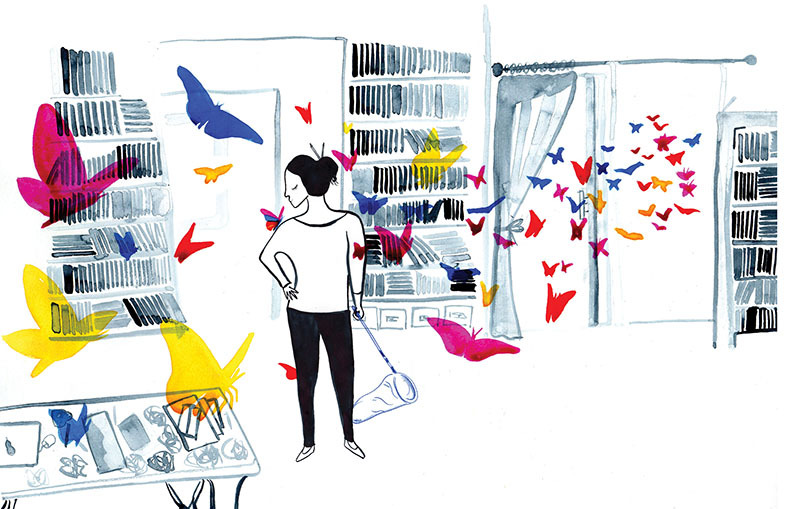Inspiration comes from the Latin in + spirare, “to breathe into,” and isn’t it pretty to think so — that the muse will tilt your head back and pinch your nose and give you the kiss of life, breathe into you something necessary, fully formed, inalienable.
That must be the supposition behind the question I get at readings: “Where do your ideas come from?” — as if you merely wait to pluck ideas like fruit or, loyal to our Latin, to have them breathed into you.
Metaphors shape the way we think, and the passivity of in + spirare does a kind of violence to the truth. Because before the being-breathed-into comes work. You write and rewrite and rewrite and rewrite, and when you think it’s done, you read and find it not finished, not glorious, not derived from genius, oh, no, but amateur, embarrassing, unworthy.
And in a fit of self-loathing, you throw the words away and start again.
There is little dignity in the creative life, is what I think when it’s going poorly. Or, as John Berryman whines in a poem, “It seems to me sometimes that others have easier jobs/ & do them worse.”
So, first, one must learn to love the working and understand the working is the reward. And only then does the possibility for inspiration exist. After the work and the more work, there can come a time when something un-worked-for arrives. Something unlooked for, presented as a gift. The poem arriving, unspooling, the fingers racing to keep up, to fasten it to the paper.

When this happens, you do not feel the pride that comes with hard work. You feel gratitude. It is serendipitous and it is benedictory and it is unpredictable. But you should not sit around idly waiting for it. What should you do instead? Work.
I tell my college students a story, perhaps apocryphal, about Arnold Palmer, who at a crucial moment in a golf tournament nailed a difficult hole-in-one. An observer commented, “Man, you sure are lucky.”
“Yes,” said Palmer, bending to fish the ball from its pocket. “It’s a funny thing. The more I practice, the luckier I get.”
Maybe the problem is not with the definition of inspiration but with our expectation of it. Why don’t you write? Oh, I’m waiting for inspiration. Anyone who waits long enough without practicing on the putting green will be inspired less and less, and, eventually, not at all.
Someone once defined a “professional” as someone who keeps working even when she doesn’t want to. As a professional poet (which sounds terrible, like being a professional friend), I’ve learned that writing when I don’t want to is sometimes the only way to write past my own ending, exceed my previous limitations, emerge on the other side. So I turn around, huffing for breath, and view my work. Okay, I tell myself, I’ve gotten this far. I turn forward again and keep slogging. And sometimes that’s the very moment I am — ahhhhhh — breathed into.
Beth Ann Fennelly directs the MFA program at the University of Mississippi, where she was Outstanding Teacher of the Year. Her newest book, The Tilted World (HarperCollins) is a novel she co-wrote with her husband, Tom Franklin.